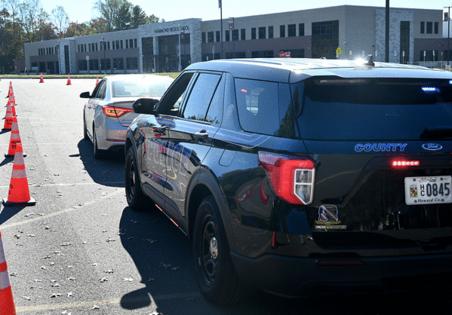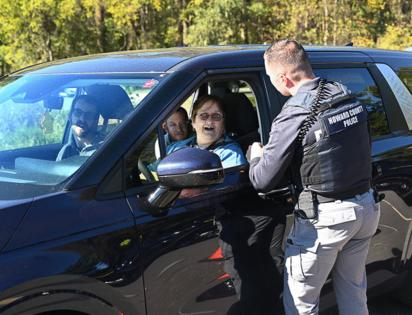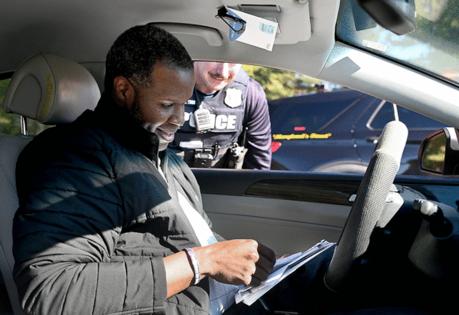For drivers on the spectrum, interactions with police can be nerve-wracking
Published in Lifestyles
BALTIMORE -- Reginald Person II, who has autism, has never been pulled over by police in real life, but a special program held recently allowed him to practice what would happen to put him more at ease.
Person, 39, of Severn, was one of many attendees of Pathways to Autism’s traffic stop practice event in Howard County. He said it helped him practice not being anxious in the situation.
“Since I’m on the spectrum, I wanted to learn the steps I should take to stay calm,” Person said. “When something like this happens, I want to know what to do.”
Gail Montgomery signed up her son Wesley to attend because he just earned his learner’s permit and she wants him to know what to expect. The Eldersburg mother-son duo came to Howard County so that he could get the practice.
“I want him equipped to handle himself, to lessen the chance of anything adverse happening,” Gail Montgomery said.
After going through the traffic stop, she realized they had never talked about what goes into being pulled over; she had never told him where the car registration was. Wesley went through the course twice to feel even more prepared.
“I’m feeling good,” Wesley Montgomery said. ” I felt like I communicated my actions clearly.”
Pathways to Autism provides resources for those on the spectrum as well as family and caregivers. Shelly McLaughlin, program director for the nonprofit, said this includes workshops and trainings as well as informational events such as the traffic stop practice, free of charge.
The organization has been offering traffic stop practices around the state since 2021; a free webinar on the topic can also be viewed on its website.
During the event, a Howard County Police Department officer simulated a traffic stop by sounding the police siren and flashing the lights. The officer then got out of the car and allowed drivers and passengers to ask questions in a controlled setting. Attendees can go through the simulation as many times as they’d like.
The next event will take place in Baltimore County on Oct. 30 at Security Square Mall, noon to 4 p.m.
“Any driver or passenger of any age is welcome to come because we also think everybody in the car should know what to do if the car gets pulled over,” McLaughlin said. “We want to reinforce that positive interaction, and we want to be able to really emphasize, Look, these are the people that will help you. These are the people you go to when you don’t feel safe or you need help.”
Attendees are given a “traffic stop toolkit,” an envelope with tips on how to interact with the police and disability disclosure cards.
After they go through the course, they are encouraged to answer a survey and visit tents set up by Pathfinders, the Maryland Autism Society and Howard County Emergency Services. Participants could also practice calling 911 and learn about features such as texting 911 and enabling medical ID on cellphones.
Events such as this are crucial to building trust and understanding between law enforcement and the autism community, said Howard County Police Lt. John Lloyd.
“What [officers] are learning is also to be patient and to be understanding; not everyone you stop you’re going to know that they have a disability,” Lloyd said. “It’s putting you through this training scenario where if someone acts differently than you would expect them to act, that doesn’t always mean that there’s a criminal element. There could simply just be a disability that you cannot see.”
Lauren Dunaway, 18, said her parents “strongly encouraged” her to go to the mock traffic stop event with other students from the Glenwood Academy. Though she’s been driving for two years, the thought of getting pulled over was “extremely nerve wracking.”
Glenwood Academy is an Eldersburg private school that focuses on helping students with language-based learning disabilities; the school brought more than a dozen students to the recent practice.
Though Dunaway, who lives in Ellicott City, had learned about what to do during her Driver’s Education course, the experience was completely different, she said.
“I am grateful that someone was with me in the car,” Dunaway said. “I felt like I might have freaked out over this, but I’m so glad I did it because now I feel more prepared in case it’s a real situation.”
©2025 The Baltimore Sun. Visit at baltimoresun.com. Distributed by Tribune Content Agency, LLC.





























Comments